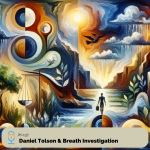
Dr. Evelyn Higgins & Wired Health
Summary
In this conversation, Matt Hampton, Tom Ingegno, and Evelyn Higgins delve into the complexities of epigenetics, mental health, and personalized medicine. They explore the journey of understanding individuality in medicine, the limitations of genetic testing, and the practical applications of epigenetics in optimizing health. The discussion highlights the importance of personalized approaches in healthcare, the role of lifestyle changes, and the challenges posed by misinformation in the health industry. In this conversation, the speakers delve into the complexities of mental health, the role of SSRIs, and the interplay between neurotransmitters like GABA and glutamate. They explore the implications of microdosing, personalized health through genetic insights, and the importance of preventative health measures. The discussion also touches on the origins of their collaboration, the significance of genetic awareness, and the evolving landscape of health insurance. Additionally, they address the challenges of youth navigating substance use and the impact of epigenetics on intergenerational trauma. In this conversation, the speakers delve into the intricate relationship between genetics, lifestyle, and health. They discuss how understanding genetic predispositions can empower individuals to make informed lifestyle choices that enhance longevity and overall well-being. The importance of community and social connections in maintaining health is emphasized, alongside personalized health recommendations based on individual genetic profiles. The conversation concludes with practical advice on how to access personalized health consultations and the potential for significant health optimization through informed choices.
Takeaways
- Evelyn has 36 years of experience in integrative pain management.
- The conversation emphasizes the need for personalized medicine.
- There is a distinction between drug use and abuse.
- Genetic testing often overlooks individual differences.
- Epigenetics can help explain changes in mental health.
- Lifestyle changes can significantly impact health outcomes.
- Not all supplements are beneficial for everyone.
- The importance of understanding one’s genetic makeup.
- Misinformation in health can lead to poor decisions.
- The role of environment in gene expression is crucial. SSRIs should be considered carefully for mental health issues.
- GABA and glutamate have a crucial balance in mental health.
- Microdosing can have significant positive effects on well-being.
- Genetic insights can personalize health approaches.
- The conversation originated from a shared interest in health.
- Understanding genetics can lead to better health outcomes.
- Insurance companies are beginning to recognize the value of preventative health.
- Health monitoring could become as routine as blood tests.
- Youth should be educated about substance use and its effects.
- Epigenetics plays a role in passing down trauma and health predispositions. Genetic predispositions can influence health outcomes significantly.
- Lifestyle choices play a crucial role in longevity and well-being.
- Community and social connections are vital for maintaining health.
- Personalized health recommendations can optimize individual health.
- Understanding one’s genetic blueprint is essential for informed health decisions.
- Loneliness is a significant health risk factor in modern society.
- Inflammation is a key factor in many health issues.
- Early identification of health risks can lead to better outcomes.
- Consultations can provide tailored health strategies based on genetics.
- The future of health care may involve more personalized and preventive approaches.
Chapters
00:00 Introduction and Background
03:00 The Journey into Epigenetics
05:57 Understanding Individuality in Medicine
08:48 The Limitations of Genetic Testing
11:53 The Role of Epigenetics in Mental Health
15:04 Practical Applications of Epigenetics
17:55 The Importance of Personalized Medicine
21:03 Navigating the Landscape of Health Information
27:33 Understanding SSRIs and Mental Health Spectrum
28:53 The GABA-Glutamate Connection
29:56 Microdosing and Its Implications
30:56 Personalized Health and Genetic Insights
32:14 The Origins of Our Conversation
34:48 The Importance of Genetic Awareness
38:50 Insurance and Preventative Health
40:58 The Future of Health Monitoring
42:55 Navigating Youth and Substance Use
46:52 Epigenetics and Intergenerational Trauma
47:37 Understanding Genetic Influences on Health
50:01 The Impact of Lifestyle on Longevity
52:05 The Role of Community in Health
55:50 Personalized Health Recommendations
01:06:16 Consulting for Health Optimization
Podcast: Play in new window | Download








